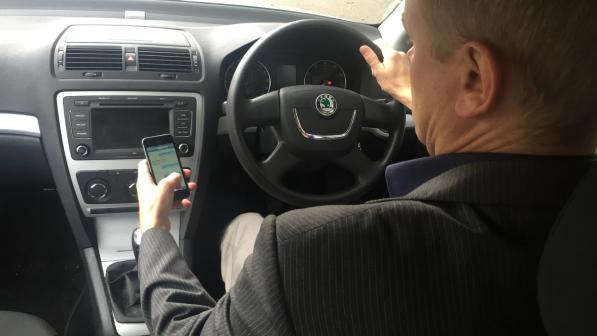Magistrates allowed texting driver to keep his licence - and Lee lost his life

Too busy texting to see a cyclist
Thirty year-old Christopher Gard was sentenced yesterday at Winchester Crown Court for causing the death by dangerous driving of father of two Lee Martin on 12 August last year, as Lee was cycling along the A31 near Bentley, Hants.
There was no criticism of Lee's riding. He was an experienced cyclist, whereas Gard's experience involved his arrogant disregard for road safety, his previous motoring convictions, and the nonchalant leniency of a justice system which put the preservation of his licence above Lee's life.
Gard drove into Lee from behind on a dual carriageway. PC David Mitchell from Hampshire Police confirmed that Gard had not been aware of the cyclist in front of him, or indeed any of the other cyclists he had passed on the A31 competing in a 10 mile time trial that evening. All because at the time he was too busy exchanging texts with a friend about walking his dog. Essentially, he was too busy to care.
A leopard's spots, nine chances and one life
Tragically for Lee, it seems that Gard was the leopard with no interest in changing his spots. Twice he had been sent on driver awareness courses for using his phone whilst driving. On six occasions since April 2009 he had been fined and incurred penalty points for the same offence.
The day he drove into Lee was the ninth time we know of that Gard came to the attention of the police for driving whilst using a mobile phone. The leopard had nine chances to change, but Lee didn't have nine lives.
Exceptional inconvenience
Anyone with 12 points on their licence in a three year period supposedly faces an automatic driving disqualification, for at least six months, under what is known as the totting up provisions. Unless of course the driver can dodge the ban by convincing the court that they will face exceptional hardship if their licence is lost. In practice, this means the difference between exceptional hardship and mere inconvenience becomes blurred as drivers plead their need to drive.
Six weeks before the incident that claimed the life of Lee, Gard appeared before a Magistrates' Court for his sixth mobile phone offence. He faced disqualification under the totting provisions but magically kept his licence. The serial offender's circumstances were exceptional!
Harm to which family?
The Magistrates bought the blarny and Gard kept his licence because of the excessive harm losing it would cause his family. The excessive harm impacted instead on Lee's family, his widow and two children. The Magistrates decided to give him a ninth chance, and Gard's licence to drive became a licence to kill.
Sentencing Gard yesterday to nine years in prison and disqualifying him from driving for 14 and a half years, Judge Susan Evans QC referred to his exceptional hardship plea saying, "On June 30 last year, just six weeks before you collided with Mr Martin, you were convicted after trial of driving whilst using a mobile telephone, and on that day you put forward to the Magistrates that you would encounter special hardship. You assured the Magistrates you wouldn't use your phone, that you would lock it in the boot of a car in a bag". A pie-crust promise he ignored.
In a statement Lee's family said, "The Magistrates chose to allow the defendant to keep his licence. The result of that lenient approach to such a serious offence was the death of Lee Martin only six weeks later. Whilst Lee's death is clearly the fault of the defendant, we feel that the legal system is somewhat to blame."
The Magistrates chose to allow the defendant to keep his licence. The result of that lenient approach to such a serious offence was the death of Lee Martin only six weeks later. Whilst Lee's death is clearly the fault of the defendant, we feel that the legal system is somewhat to blame.
Statement by Lee Martin's family
Still waiting for the offences and penalties review
Over a year before Gard kept his licence the then Justice Secretary Christopher Grayling MP announced the Government's intention to carry out a review of motoring offences and penalties. Nothing happened. Michael Gove took over as Justice Secretary a year later, and as Cycling UK reported, we were still waiting for something to happen two months ago.
Gove has now gone, post Brexit, and we have a new Justice secretary, Elizabeth Truss MP. Cycling UK wrote to her about the delayed offences and penalties review in July, and have been told that Ministry of Justice officials "will be in touch after the summer recess".
The review of motoring offences shouldn't just be about those cases like Lee's where death or serious injury are caused. The issues which need to be addressed, so cruelly evidenced in the sorry Gard saga, include the minimisation of mobile phone offences, the failure to treat and charge mobile phone use whilst driving in some cases as careless or dangerous driving, and the unwillingness of the courts to disqualify drivers.
One of Cycling UK's priorities for the review is addressing the inconsistency behind the truly ridiculous exceptional hardship plea, which defeats the purpose ot the totting up provisions. It treats inconvenience as exceptional hardship, placing licence preservation and driver inconvenience above road safety.
Lee's family said that he died doing something he loved: cycling. Cycling UK believes the person responsible for his death should have lost his licence to drive before last August, and that the justice system should have dealt with Gard's abject disregard for others more seriously, and sooner.
We wait to see if the new Justice Secretary has more enthusiasm for our Road Justice Campaign, and whether she will now accelerate the review, the need for which Lee's case demonstrates, and which should have been concluded long before his tragic death.


